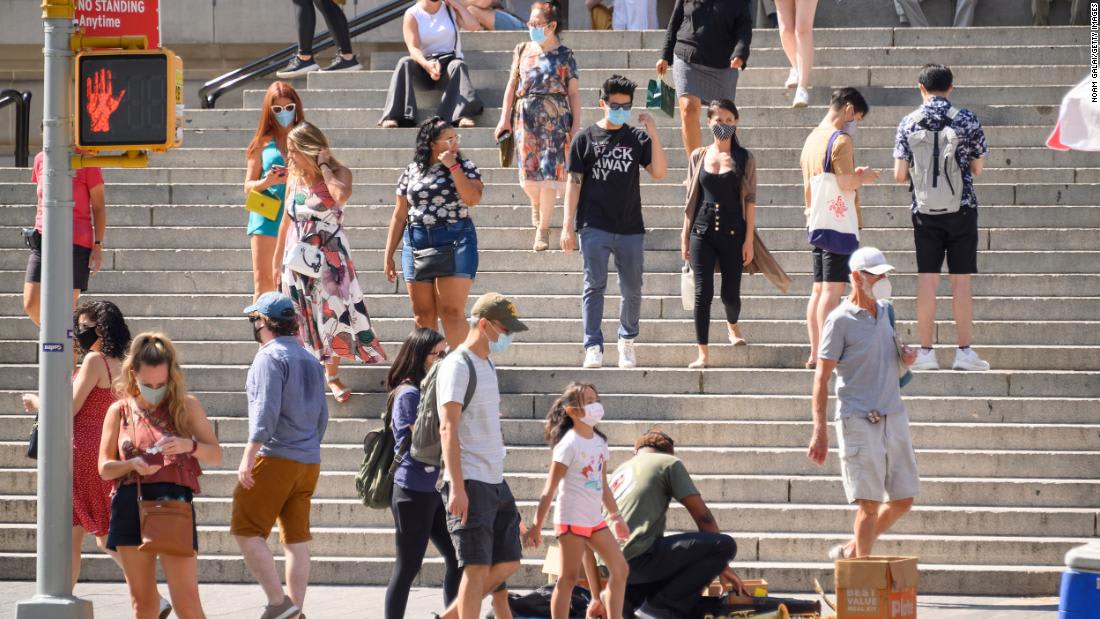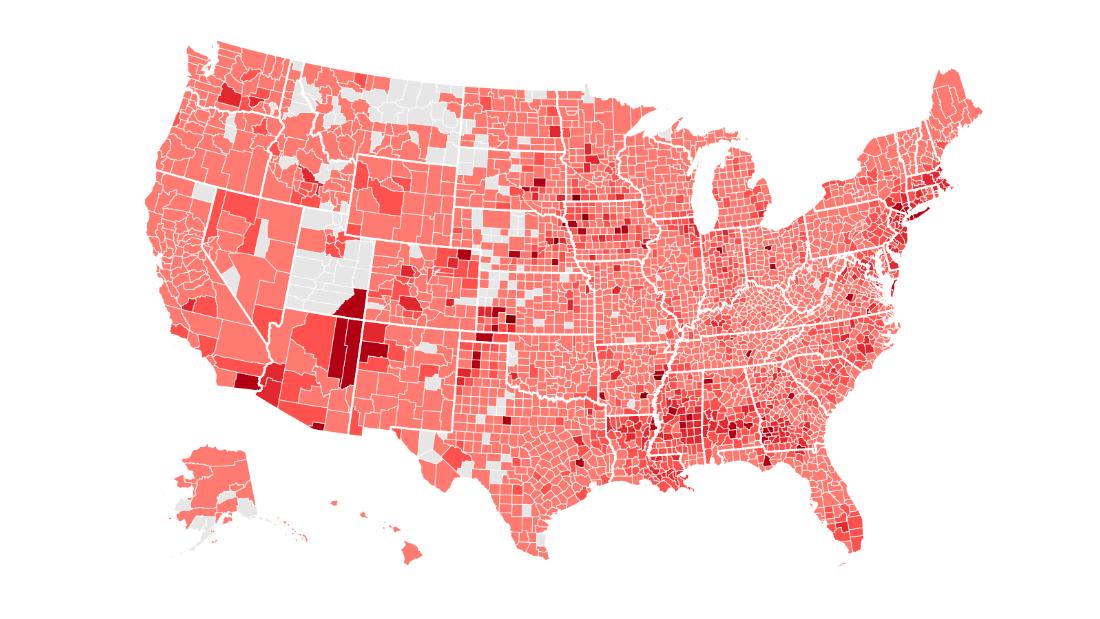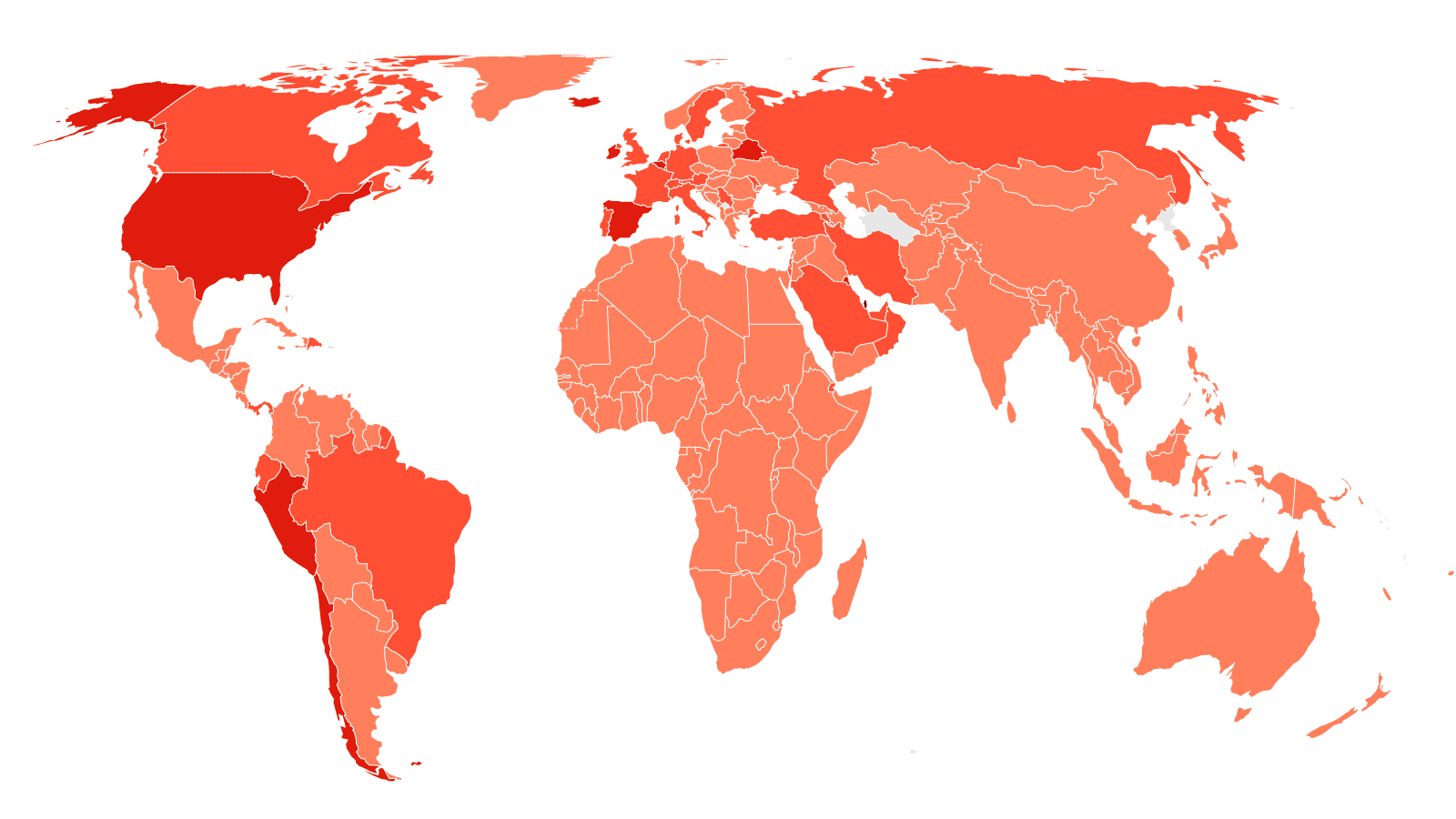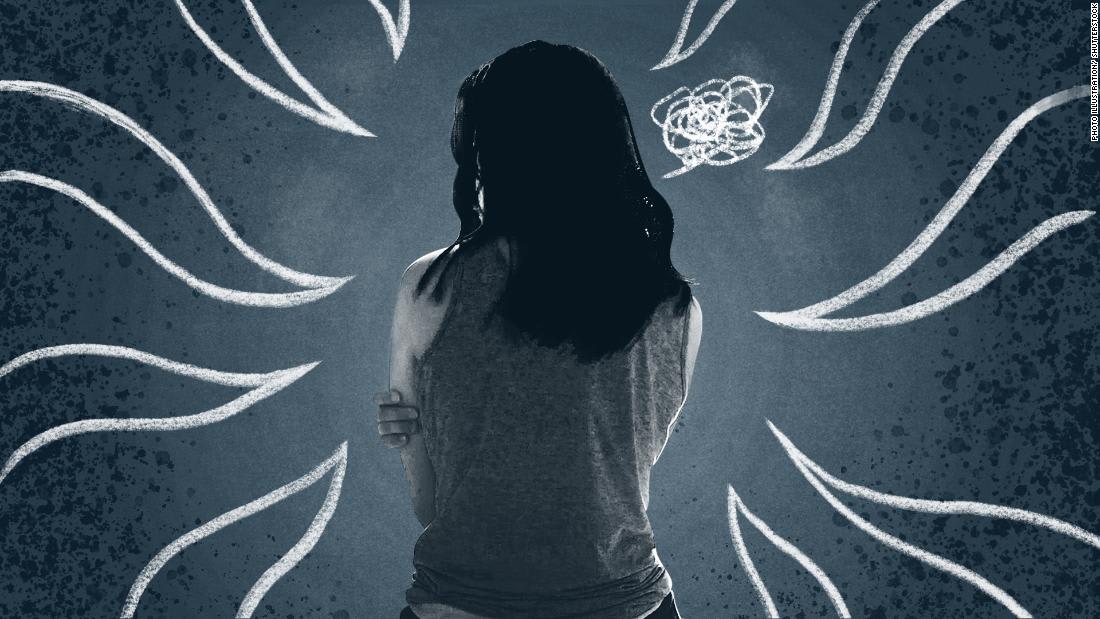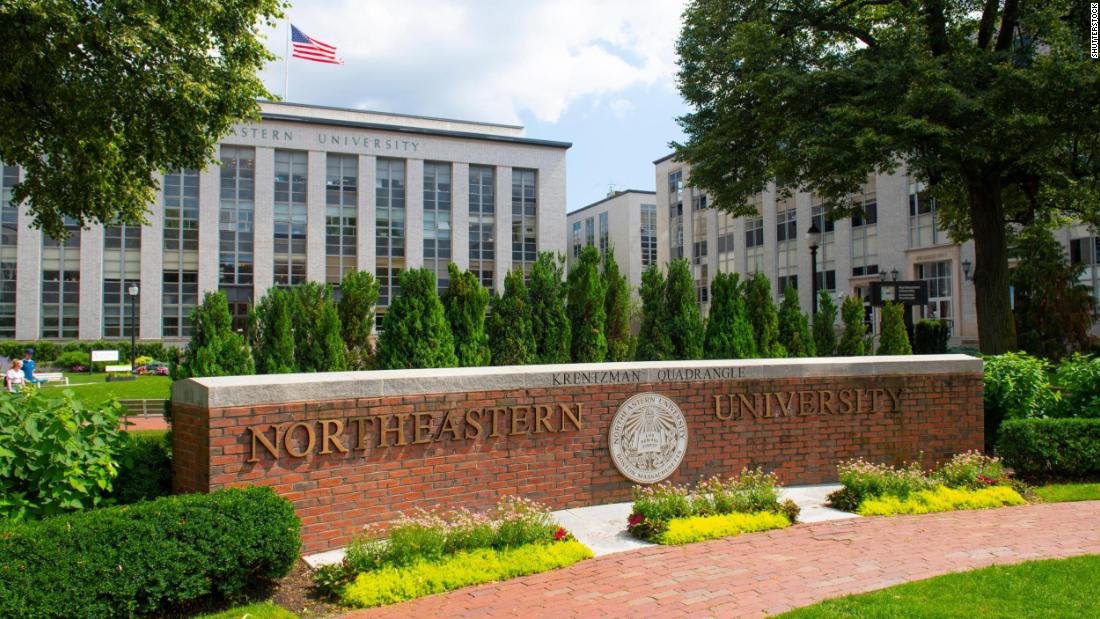Australia signs $1.2 billion agreement for nearly 85 million coronavirus vaccine doses
Australians will have access to a free Covid-19 vaccine at some point in 2021, if trials prove successful, after the government signed a supply and production deal worth $1.7 billion Australian dollars ($1.2 billion) for tens of millions of doses.
Under the agreement, the University of Oxford/AstraZeneca and the University of Queensland/CSL will provide at least 84.8 million doses of their potential vaccines, according to an Australian government statement today.
Up to 3.8 million doses of the University of Oxford/AstraZeneca vaccine will arrive as early as January 2021, the statement added.
The government's deal with the University of Oxford/AstraZeneca was first reported on August 19.
Prime Minister Scott Morrison said that the vaccines would be free for Australian citizens.
Health Minister Greg Hunt said that while vaccinations helped save lives, a coronavirus vaccine would not be mandatory.
The vaccines: According to the statement, the University of Oxford/AstraZeneca vaccine has entered Phase 3 trials, the final stage of testing. "To date it has generated strong immune responses, with no significant safety concerns," the release said.
Developed in Australia, the University of Queensland vaccine is already effective in animal models, the statement said, citing the university.
South Korea wants to check citizens for coronavirus and seasonal flu in one test
From CNN's Jake Kwon in Seoul
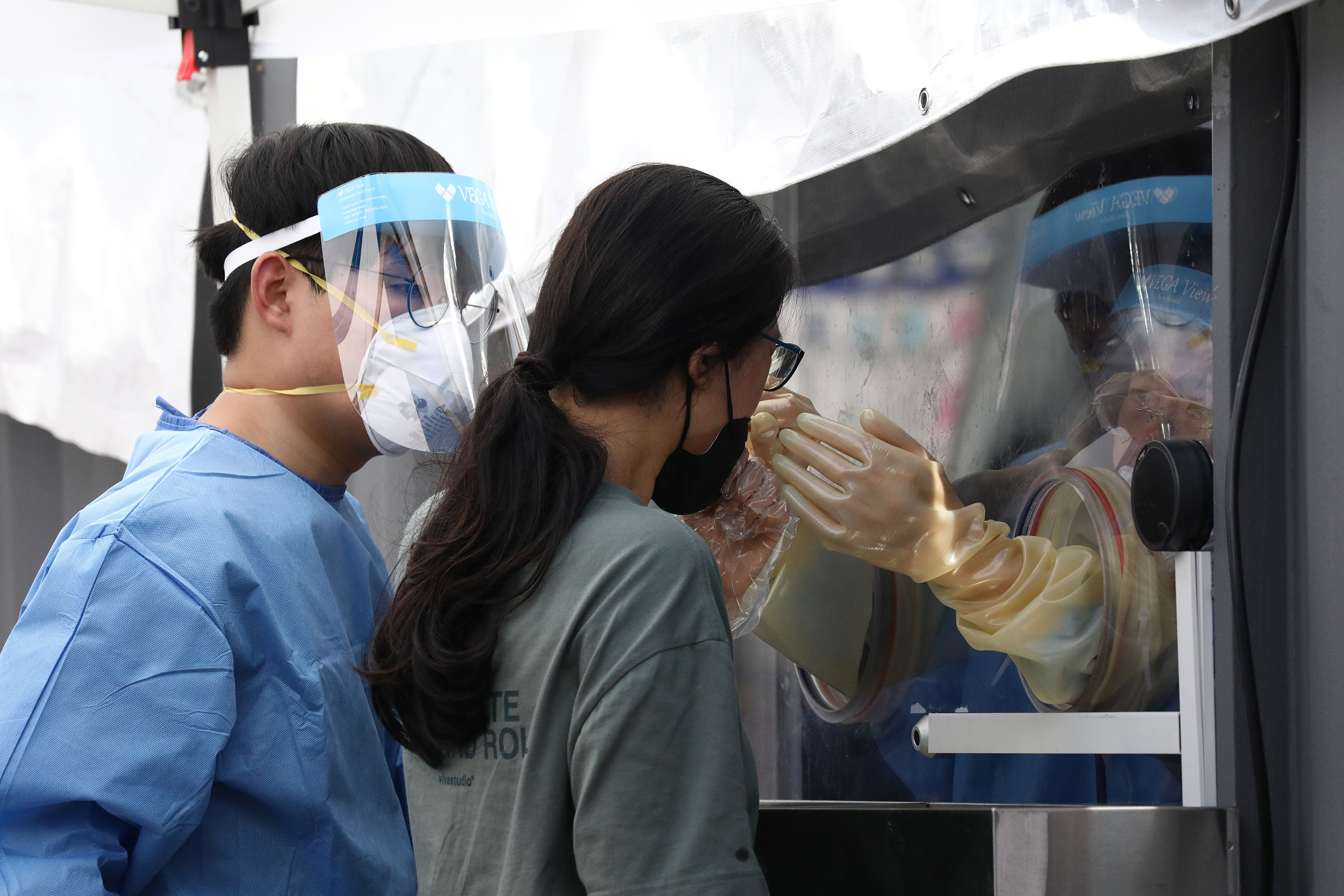 A medical worker takes samples from a woman during Covid-19 testing at a temporary test facility on August 26, in Seoul. Chung Sung-Jun/Getty Images
A medical worker takes samples from a woman during Covid-19 testing at a temporary test facility on August 26, in Seoul. Chung Sung-Jun/Getty ImagesSouth Korea is developing a testing kit that can detect seasonal flu and Covid-19 at the same time, according to the country's Centers for Disease Control and Prevention (KCDC)
As symptoms of Covid-19 and seasonal flu are similar it's important to detect the difference for the coming fall flu season, KCDC director Jung Eun-kyeong said at a news conference on Monday.
South Korea’s Ministry of Food and Drug Safety is currently going through the permit process to approve the test. The kit will allow detection of either virus from a single sample, Jung said.
Epidemic eases: South Korea reported 108 new locally transmitted cases and 11 imported cases Monday, bringing the total to 21,296.
The total death toll is now 336, after two new fatalities on Sunday. Most of the new cases were reported in the Seoul metropolitan area.
South Korea is currently battling a second wave of infections, which rose as high as 441 daily cases in late August.
South Korean President Moon Jae-in said Monday that coronavirus restrictions were helping to curb the spread of the virus.
However, despite the drop in new cases, the Ministry of Health said it was considering continuing social distancing measures during the upcoming Chuseok holiday in late September. The three-day holiday, known as "Korea's Thanksgiving," traditionally sees people travel across the country to gather with their families.
New York governor urges the public to be cautious over Labor Day to keep infections from spiking
From CNN's Madeline Holcombe
New York state, once the epicenter of the Covid-19 pandemic in the US, has maintained a positive infection rate of below 1% for 30 straight days.
In another hopeful development, Gov. Andrew Cuomo announced Sunday that the state's hospitalizations from the virus have dropped to a new low since March 16.
But that's no reason to think the fight against the virus is over, officials say.
"As this virus continues to be a national crisis, it's clear that caution is a virtue, not a vice," Cuomo said.
After a summer resurgence, the virus has now infected more than 6.2 million people in the US and resulted in 188,941 deaths, according to Johns Hopkins University.
Some states, like New York, are seeing promising trends. As of early Monday, 18 states were reporting fewer new cases over the past seven days compared with the week prior. Another 16 were holding steady. Still, officials and experts have warned that the public must continue practicing preventative measures or risk a resurgence in the fall and winter.
The best way to avoid the outbreaks that followed Memorial Day and Fourth of July weekends is to wear masks, avoid crowds and keep a safe distance from others, Dr. Anthony Fauci, director of the National Institute of Allergy and Infectious Diseases, said leading up to Labor Day weekend.
Read the full story:
Subway trains resume in India after more than five months of coronavirus standstill
From CNN's Esha Mitra in New Delhi
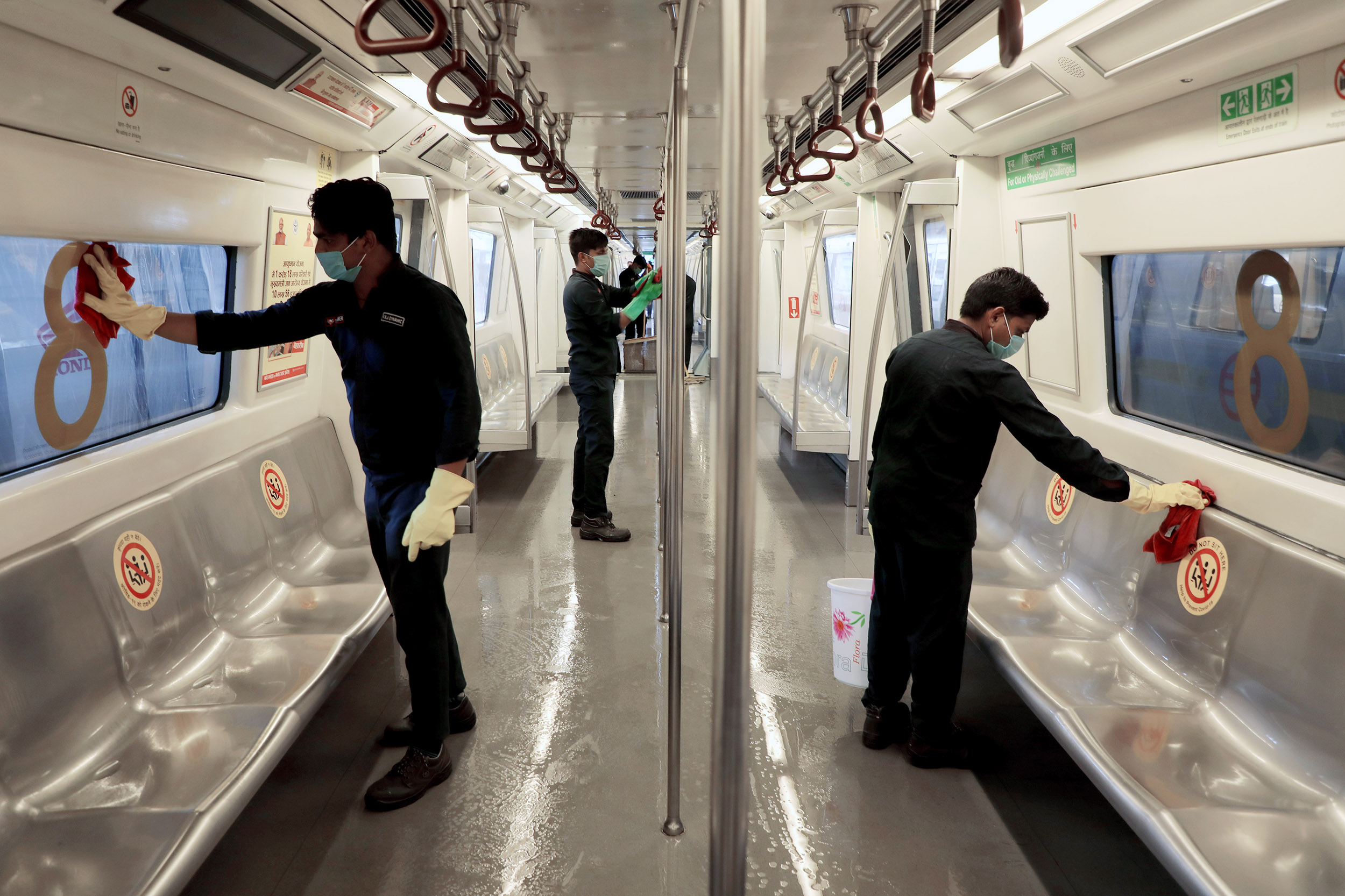 Workers disinfect the interior of a Delhi metro rail carriage at the Khyber Pass metro depot ahead of the resumption of services in New Delhi on Sunday, September 6. T. Narayan/Bloomberg via Getty Images
Workers disinfect the interior of a Delhi metro rail carriage at the Khyber Pass metro depot ahead of the resumption of services in New Delhi on Sunday, September 6. T. Narayan/Bloomberg via Getty ImagesFor the first time in five months, subway trains are slowly beginning to come back into service in India.
All public transport, including suburban trains, was suspended when the country announced a nationwide lockdown on March 24, amid a growing coronavirus epidemic.
The trains resumed operations as infections surged to a fresh daily high of 90,802 new cases Monday that saw India surpass Brazil as the country with the second-highest number of total cases, after the United States.
India now has 4,204,613 confirmed cases of Covid-19, including 71,642 deaths.
Despite the rising number of infections, the government announced on August 29 that subway trains would resume in cities from September 7 in a "graded manner".
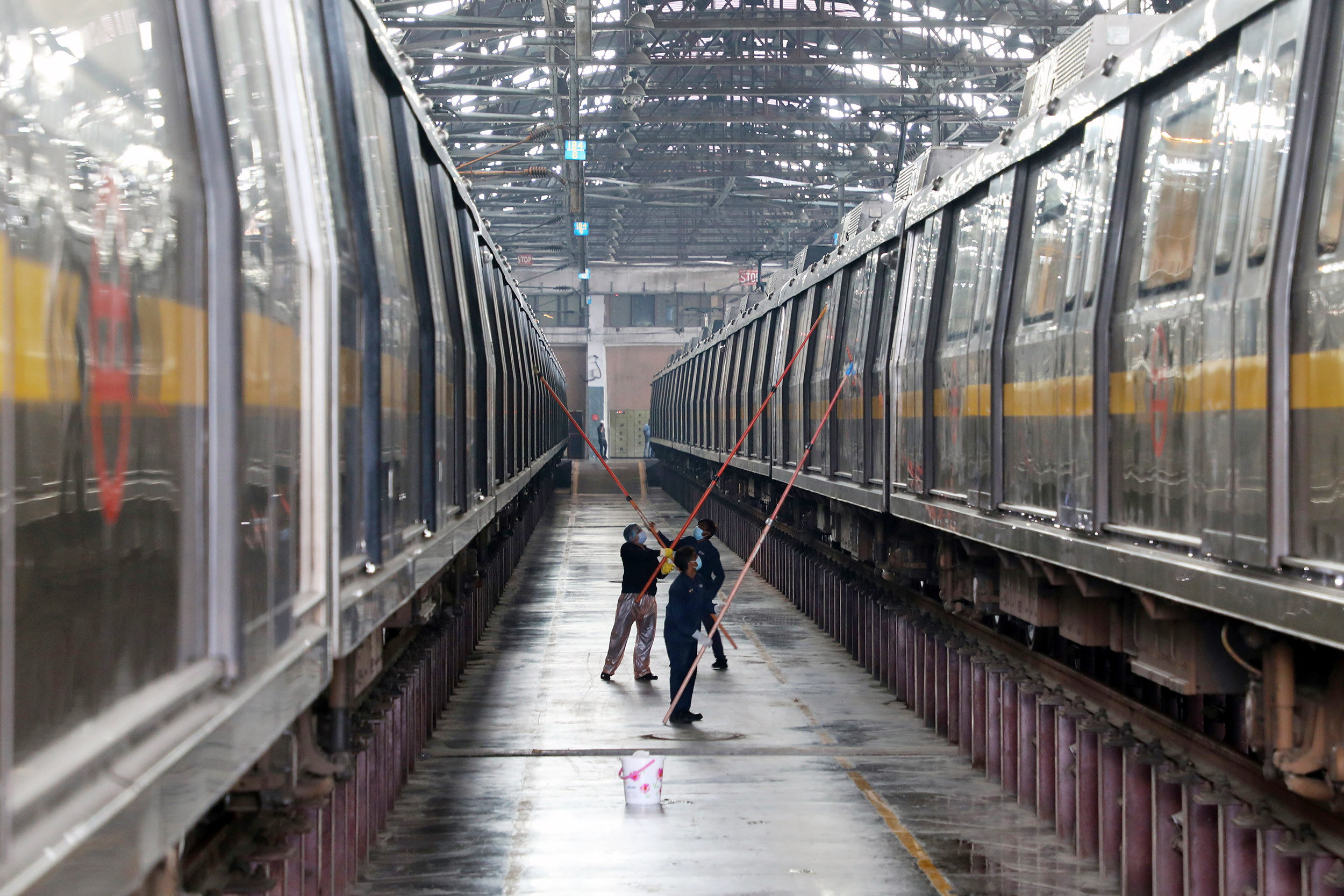 Workers disinfect the exterior a Delhi metro rail carriage. T. Narayan/Bloomberg via Getty Images
Workers disinfect the exterior a Delhi metro rail carriage. T. Narayan/Bloomberg via Getty ImagesDelhi, Noida, Chennai, Kochi, Bangalore, Jaipur, Hyderabad, Gujarat, Kolkata and Lucknow metros will begin resuming services gradually from Monday, with a goal of full capacity by September 12.
Maharashtra, including the financial capital of Mumbai, will continue to suspend metro services until October, according to a statement from the Ministry of Housing and Urban affairs.
Only asymptomatic passengers will be allowed to travel in the metros, while wearing of face masks will be mandatory and cashless transactions encouraged to help contain the spread of coronavirus, according to guidelines issued by the ministry.
US records more than 31,000 new Covid-19 cases
The United States recorded 31,395 new cases of the novel coronavirus on Sunday, bringing the nationwide total to at least 6,276,365 infections, according to Johns Hopkins University.
The death toll rose to at least 188,941 after 403 new virus-related fatalities were also recorded Sunday.
The totals include cases from all 50 states, the District of Columbia and other US territories, as well as repatriated cases.
CNN’s is tracking US cases here:
India overtakes Brazil as country with second-highest number of Covid-19 cases
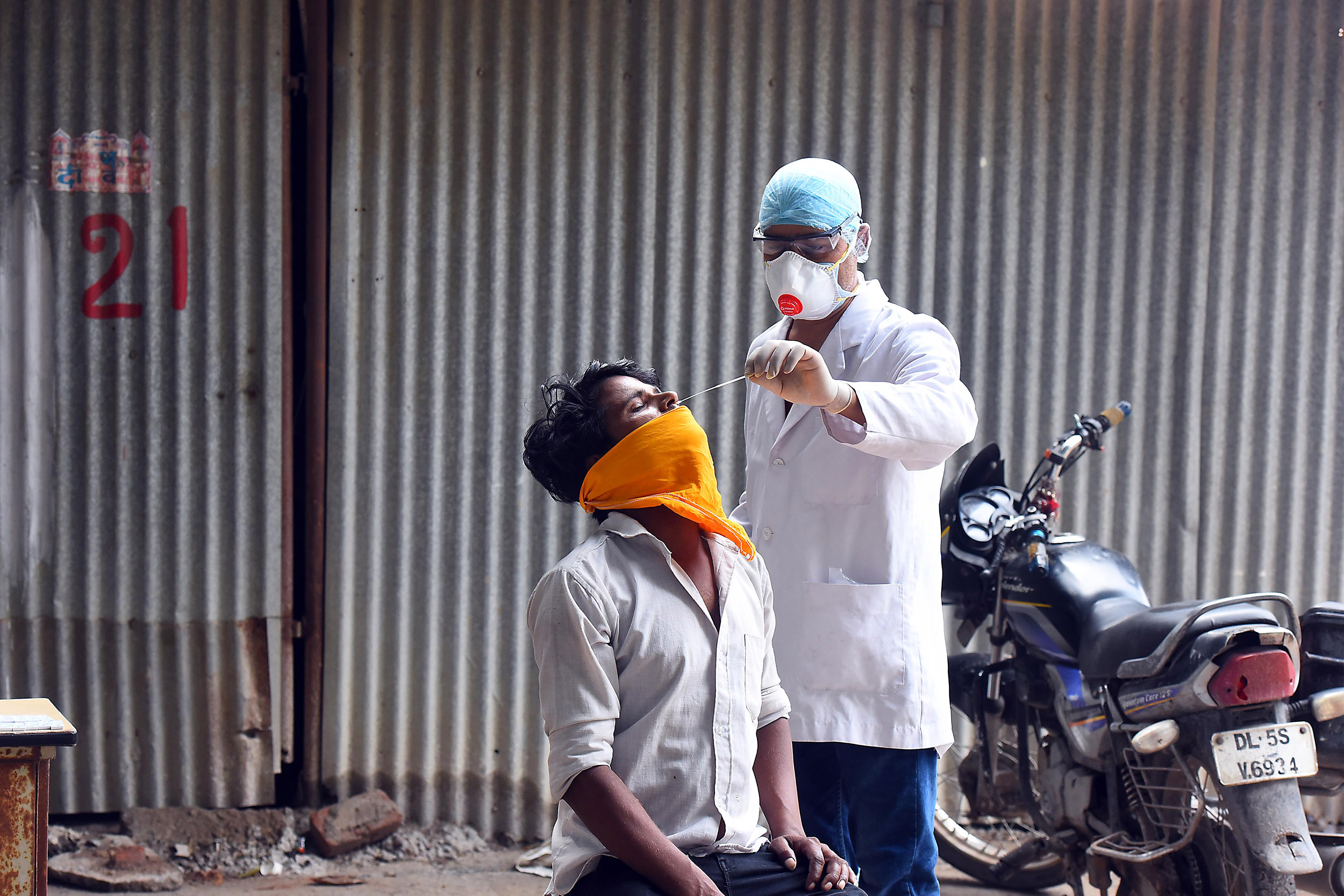 A health worker takes a swab sample from a man for coronavirus testing on September 6, in New Delhi, India. Raj K Raj/Hindustan Times/Getty Images
A health worker takes a swab sample from a man for coronavirus testing on September 6, in New Delhi, India. Raj K Raj/Hindustan Times/Getty ImagesIndia has surpassed Brazil as the country with the second-highest number of confirmed Covid-19 cases after reporting a fresh daily high of 90,802 new infections on Monday.
India's total number of cases now stands at 4,204,613, according to the Indian Ministry of Health and Family Welfare. In comparison, Brazil has confirmed 4,137,521 cases, according to Johns Hopkins University.
India is the world's second most populous nation, home to more than 1.3 billion people -- more than six times the population of Brazil.
The United States remains the country with the highest number of recorded cases. As of Sunday night, the US had reported 6,275,643 cases, according to JHU.
Low death rate: As of Monday, India had recorded 71,642 virus-related deaths, far below the US at nearly 189,000 deaths and Brazil's more than 126,000 fatalities.
India's death rate of five virus-related fatalities per 100,000 people is lower than more than 80 countries and territories, according to JHU data.
For comparison, the US death rate is 58 per 100,000 people, while Brazil's is 60 per 100,000 people, according to JHU.
Reopening: The rapid rise in infections in India comes after the government announced a new phase of reopening last week. Subway trains will be allowed to run for the first time in months from September 7 while gatherings of up to 100 people will be permitted at sports, entertainment, cultural and religious events outside of hotspot areas from September 21.
Schools and colleges will remain closed until the end of September.
CNN is tracking worldwide coronavirus cases here:
India didn't prioritize mental health before Covid-19. Now it's paying the price
From CNN's Esha Mitra in New Delhi
"My heartbeats are heavy. It becomes difficult to catch my breath. My hands shake and get sweaty," said Aritri Paul of the terrifying panic attacks that strike more frequently since India went into coronavirus lockdown in March.
India's government started easing the most severe restrictions on daily life in June, but the effects of the lockdown on residents' mental health are still emerging, as the country battles one of the most severe Covid-19 outbreaks in the world.
India now has over 4.1 million cases of the virus, giving it the third-highest tally of recorded cases globally, behind the Unites States and Brazil.
Research conducted by the Suicide Prevention in India Foundation (SPIF) in May found that nearly 65% of 159 mental health professionals surveyed reported an increase in self-harm among their patients. More than 85% of therapists surveyed said they were experiencing caregiver fatigue, and over 75% said fatigue had impacted their work.
Another survey in April, by the Indian Psychiatric Society, showed that, of 1,685 participants, 40% were suffering from common mental health disorders, such as anxiety and depression, due to the pandemic.
Read the full story:
Northeastern University dismisses 11 students for violating the school's public health protocols
From CNN's Amir Vera
Northeastern University has dismissed 11 students after they were found violating the school's public health protocols, the school said in a statement.
The students were part of the N.U.in Program, a study abroad experience for first-year students, the university said. The program was modified because of the coronavirus pandemic, and over 800 students are staying in two-person rooms at a Westin Hotel less than one mile from the school's main campus in Boston, Massachusetts.
The 11 students were found together in a room at the Westin on Wednesday night, the school said. The students and their parents were told Friday they must vacate the hotel within 24 hours and that they are required to undergo Covid-19 testing at Northeastern.
Read the full story:
New York state maintains a positive coronavirus infection rate below 1%
From CNN's Sheena Jones
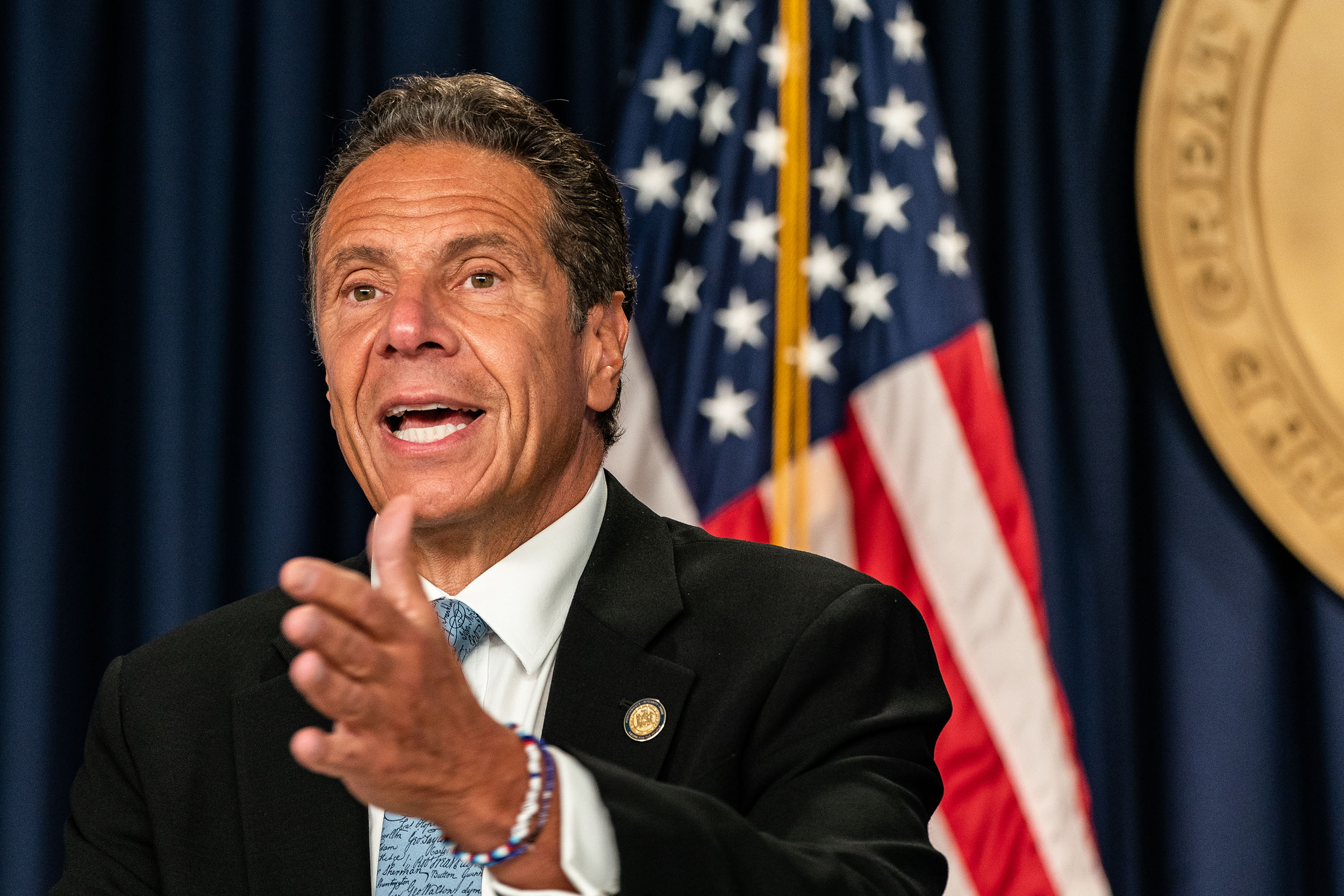 New York Gov. Andrew Cuomo speaks during the daily media briefing at the Office of the Governor of the State of New York on July 23, in New York. Jeenah Moon/Getty Images
New York Gov. Andrew Cuomo speaks during the daily media briefing at the Office of the Governor of the State of New York on July 23, in New York. Jeenah Moon/Getty ImagesThe state of New York has maintained a positive Covid-19 infection rate below 1% for 30 straight days, a release from Gov. Andrew Cuomo’s office said.
The state had a positive infection rate of 0.85% reported Saturday, the release said.
Hospitalizations across the state have dropped to 410, which is the lowest number since March 16, according to the release.
The governor added: "Our infection rate has been below 1% for 30 days, and New Yorkers can help us keep that streak going by wearing masks, socially distancing, and washing their hands. Our actions today determine the rate of infection tomorrow, so as the Labor Day weekend continues, I urge everyone to be smart so we don't see a spike in the weeks ahead."

 5 years ago
619
5 years ago
619 